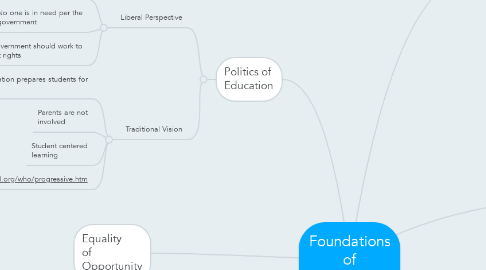
1. Politics of Education
1.1. Liberal Perspective
1.1.1. Believe the government controls equality
1.1.2. No one is in need per the government
1.1.3. The government should work to protect rights
1.2. Traditional Vision
1.2.1. Education prepares students for life
1.2.2. Parents are not involved
1.2.3. Student centered learning
1.2.4. www.wingraschool.org/who/progressive.htm
2. Schools as Organizations
3. Curriculum and Pedagogy
4. Equality of Opportunity
5. Educational Reform
6. Sociological Perspsectives
6.1. Socialization Theory
6.1.1. Begins At Birth
6.1.2. Children become valuable members of society based on acquired traits
6.1.3. Comes from experiences and social interactions
6.2. Effects of schooling on individuals
6.2.1. Socialization- Students become who they are as a person based on social interactions
6.2.2. Moral Values- Children's morals are impacted and shaped by what they are surrounded by daily due to peers and teachers.
6.2.3. Successful Interdependence Traits- Students learn to thrive in group settings; they do not forget that the success of their peers is important for their own success.
7. History of US Education
7.1. Child-centered reform
7.1.1. Individualized learning for students
7.1.2. Explicit teaching used in instruction as opposed to "I talk, you listen"
7.1.3. Lessons are not simply read from text books anymore
7.2. Utilitarianism
7.2.1. If it benefits most people, it can't be wrong.
7.2.2. Greater happiness, greater good
7.2.3. Considered moral based off populations happiness
8. Philosophy of Education
8.1. I function under the notion that the Progressive approach to teaching is the most beneficial to a child's education.
8.1.1. Teacher guides students, not dictates
8.1.2. Education creates independent members of society
8.1.3. Hands-on instruction with all members of the classroom participating
8.1.4. Curriculum fits each student based on individual benchmarks and progress.
8.1.5. School challenges students to think critically. Values the students ideas.

